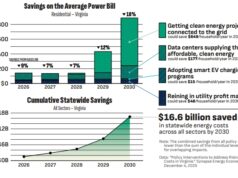By Seth Heald, cross posted from Power for the People VA
In guest blogger Seth Heald’s last post here, he discussed the strange fact that top executives at Dominion Power don’t talk about climate disruption, even though it is a major driver of the tectonic shifts underway in the nation’s power sector. Many of us assumed the climate silence at Dominion means its executives want to avoid a subject that can be politically divisive. Turns out some of them are talking–but not in a good way. Heald brings us the story.
As I’ve written elsewhere, senior Dominion executives and other electric utility officials tend to avoid mentioning climate change in their public discussions. Dominion Virginia Power president Bob Blue avoided that unpleasant topic in his keynote luncheon speech at a recent Virginia resiliency conference, a forum where one has to work to avoid mentioning climate change. That sort of climate silence at the corporate top leaves the public wondering what Dominion executives really think, or whether they think much at all, about climate change.
It may also leave other Dominion executives in doubt about where their company stands. Last month a curious letter to the editor appeared in the Richmond Times-Dispatch headlined “Actually scientists disagree about climate.” At first glance the letter seemed ordinary—reciting misguided climate-science denial arguments for not acting to reduce greenhouse-gas emissions. It complained about “alarmists” who (the letter claimed) refuse to acknowledge benefits of climate change. And it suggested that Americans devote “our limited dollars” to adapting to climate change rather than slowing it by reducing greenhouse-gas emissions.
Letters of this ilk appear with depressing regularity in the Times-Dispatch and many newspapers. They misrepresent the state of climate science, reciting talking points that can be found on any of a number of denialist websites, or heard at conferences sponsored by fossil-fuel funded groups such as the American Legislative Exchange Council (ALEC). That’s sad, but not unusual.
But this climate-science denial letter was different in one key respect—it was written by David Shuford, a vice president and deputy general counsel at Dominion Resources Inc., Virginia’s largest energy company and the commonwealth’s biggest emitter of climate-disrupting carbon dioxide. (Shuford’s letter did not note his Dominion connection).
Now that is noteworthy.
What’s more, the Times-Dispatch published a similar Shuford letter earlier this year in which he complained about climate change “warmists” who are “watermelons” (“green on the outside, red on the inside”).
As Dave Barry would say, I am not making this up—a senior Dominion executive really is making these arguments in the press.
A few years ago Shuford served as “Vice President – Policy and Business Evaluation, Alternative Energy Solutions” at Dominion. According to Dominion’s Citizenship & Sustainability Report, the company’s Alternative Energy group “drives innovation by researching and evaluating renewable and emerging energy technologies to assess their commercial viability and potential for building a more sustainable economy.” Virginia lags neighboring states in deploying clean energy such as solar and wind, in no small part because Dominion has opposed measures of the sort that have helped other states ramp up clean energy.
That makes Shuford’s letters all the more noteworthy.
I phoned Shuford at his Dominion office to be sure he had really written the recent letter. He confirmed he had, but was quick to emphasize that he wrote it on his own, that he did not purport to speak for Dominion, and that no one at Dominion had reviewed the letter before he sent it. The letter, he said, reflects his personal views.
In an odd sense, Shuford’s going public with his views is refreshing—we know where this Dominion executive stands on climate change. His views are ill-informed and dangerous for his industry, our commonwealth, our country, and our world, but at least we know what he thinks. Which Dominion executives disagree with Shuford? Are any of them willing to publicly refute his arguments and accurately inform the public about climate change?
Is Shuford an outlier at Dominion, or do his views perhaps align with what other company executives think? Dominion acknowledges on its website that climate change is a concern, but in the same paragraph notes its plans to use greenhouse-gas emitting coal and natural gas far into the future. The company’s website says it wants a national climate change policy to “be developed legislatively,” yet Dominion also financially supports ALEC, which has worked for years to misinform legislators about climate change and block efforts to reduce greenhouse-gas emissions. Many large corporations have left ALEC for that reason, including Virginia’s other big electric utility, AEP. But Dominion has stuck with ALEC.
What’s most offensive and cruel about Shuford’s recent letter is his suggestion that we focus solely on climate adaptation rather than reducing greenhouse-gas emissions. He seems unaware of the analyses showing that reducing emissions now is highly cost effective compared to the astronomical costs of adaptation without emission reductions. And I doubt that the adapting he’s thinking of includes helping poor people in the third world adapt to sea-level rise, floods, drought, disappearing glaciers, or extreme weather caused in large part by the developed world’s greenhouse-gas emissions. Nor does he seem aware that relying on adaptation alone essentially writes off the entire Hampton Roads region, where many Dominion customers live.
Dominion claims that ethics is one of its four core values. Top executives at an ethical company would feel compelled to respond promptly, forcefully, and publicly to a published letter from a company vice president suggesting that we ought not to reduce greenhouse-gas emissions because people can simply adapt to climate change.
Dominion’s board should require the company to conduct training for executives and board members on climate-change ethics, and for that matter on climate science too.
Seth Heald is chair of the Sierra Club Virginia Chapter. He is a student in the Master of Science in Energy Policy and Climate program at Johns Hopkins University.
For curious readers, reprinted below is Mr. Shuford’s letter, as published in the Times-Dispatch. That is followed by an annotated version that provides Seth Heald’s responses to Mr. Shuford’s points (in italics), with citations to sources with accurate information.
Actually, scientists disagree about climate
Editor, Times-Dispatch:
Can we please stop the nonsense about science-supported climate change believers and science-denying climate change skeptics?
We are constantly told that “the science” is settled, that 97 percent of scientists agree on “the science,” and that the benighted few who disagree must be shunned or even prosecuted. In truth, the debate is far more real — even in the scientific community — than these armchair experts apparently realize.
There has never been 97 percent scientific agreement on the questions that matter with climate change. Simply repeating it doesn’t make it true. No one disagrees with the fact that the climate is changing. And most everyone agrees with the so-called greenhouse theory — that carbon dioxide causes the atmosphere to warm and that man has contributed to its concentration in the atmosphere.
The real debate in and outside the scientific community is over questions that flow from that theory, including the following:
(1) How much of global warming is due to mankind and how much is natural?
(2) Are there forces that counteract the greenhouse effect that aren’t being considered in the climate alarmists’ computer models (which might explain how their computer models have proven so inaccurate)?
(3) Does the absence of warming over the past 15 years disprove the alarmists’ theories about catastrophic global warming and, if not, why not?
(4) Will warming in the next century really be catastrophic, or could it actually be beneficial in ways the alarmists won’t concede?
(5) Given that the celebrated Paris Climate Agreement will have negligible effect on global temperatures even if every country complied, would our limited dollars be better spent on adapting to a warmer climate than on trying to prevent it?
So enough with the trope about the 97 percent versus “deniers.” There simply is no scientific consensus on the questions that will drive public policy on this issue.
David Shuford.
Richmond.
Mr. Shuford’s letter, with annotated response
Editor, Times-Dispatch: Can we please stop the nonsense about science-supported climate change believers and science-denying climate change skeptics?
We are constantly told that “the science” is settled, that 97 percent of scientists agree on “the science,” and that the benighted few who disagree must be shunned or even prosecuted. In truth, the debate is far more real — even in the scientific community — than these armchair experts apparently realize.
There has never been 97 percent scientific agreement on the questions that matter with climate change. Simply repeating it doesn’t make it true.
See this 2016 paper confirming that there is a high degree of consensus about human-caused climate change among climate-science experts. See also this 2004 paper by (now) Harvard Professor Naomi Oreskes, published in Science, the journal of the American Association for the Advancement of Science. Also well worth reading is Merchants of Doubt, by Oreskes and Erik Conway, which details efforts by corporations to mislead and create confusion about the science concerning cigarette smoking and climate change.
No one disagrees with the fact that the climate is changing.
In fact a large number of people have attempted to argue that climate change is a hoax, and many still do, including a number of the candidates in the recent Republican presidential primary contest, such as Ted Cruz and Donald Trump, to name just a couple. But it is true that some of the fossil-fuel funded groups that formerly argued that there is no global warming have reacted to criticism by changing their argument to “the climate is always changing,” as if that somehow disproves the scientific consensus that human greenhouse-gas emissions are causing dangerous warming. A good example of the changing arguments of fossil-fuel-supported climate misinformers is ALEC—the American Legislative Exchange Council, which Dominion Resources belongs to and supports financially.
And most everyone agrees with the so-called greenhouse theory — that carbon dioxide causes the atmosphere to warm and that man has contributed to its concentration in the atmosphere.
Not true. Those, like Donald Trump, who say global warming is a hoax certainly don’t agree with this. Nor does Ted Cruz, who last year agreed that his climate position is “full out denial.” Some climate change deniers make statements like “carbon dioxide is harmless, you’re breathing it now,” as if that somehow disproved the disturbing warming effects that scientists have found. And of course Senator James Inhofe famously brought a snowball into the senate in winter in an effort to show that global warming is a hoax.
The real debate in and outside the scientific community is over questions that flow from that theory, including the following:
- How much of global warming is due to mankind and how much is natural?
False. There is no real debate in the peer-reviewed scientific literature over the fact that the unusual, accelerating global warming seen since the 19th Century is attributable to the increase of greenhouse gases, primarily carbon dioxide, in the atmosphere due to burning fossil fuels. An excellent book to read on this is The History of Global Warming, by Spencer Weart (2d ed. Harvard Univ. Press 2008). It’s a scholarly book that is clear and approachable for lay readers. See also the links below to reports by several prestigious scientific bodies.
- Are there forces that counteract the greenhouse effect that aren’t being considered in the climate alarmists’ computer models (which might explain how their computer models have proven so inaccurate)?
What are these unnamed “forces”? Shuford doesn’t say. What is Shuford’s evidence that climate models have “proven so inaccurate”? In fact climate models have proven to be generally accurate in predicting the warming that has occurred. The fact that they are not perfect is hardly surprising. Moreover, our knowledge of global warming is informed not only by models, but studies of the Earth’s warming and cooling over millions of years, which have shown a direct link between high atmospheric concentrations of carbon dioxide and higher global temperatures.
- Does the absence of warming over the past 15 years disprove the alarmists’ theories about catastrophic global warming and, if not, why not?
There hasn’t been an absence of global warming in the past 15 years. In fact 2014 and 2015 set new records for average global temperatures. Shuford’s claim, which is promoted by a number of fossil-fuel supported interests is demonstrably false. Scientific American published a good summary of the issue earlier this year.
- Will warming in the next century really be catastrophic, or could it actually be beneficial in ways the alarmists won’t concede?
This claim is not only absurd, but unethical and cruel in its disregard for the world’s poorest people who are threatened in this century and next by sea-level rise, storm surges, disappearing glaciers, flooding, drought, and mass species extinctions. There may well be a small number of people who will benefit during their lifetimes from warmer temperatures and a changed climate, but that is dwarfed by the number of people who will suffer by losing their property, their livelihoods, their health, and their lives due to climate change. Our species evolved to live in the stable climate we’ve had for thousands of years, and people settled in places suitable for the climate we have. The Hampton Roads area, which is served by Dominion Virginia Power, is particularly susceptible to future inundation, which will affect rich and poor Virginians, with the poor harmed disproportionately and least able to recover quickly from their losses.
- Given that the celebrated Paris Climate Agreement will have negligible effect on global temperatures even if every country complied,
Shuford’s boss at Dominion, Thomas Farrell, II, has refused to talk publicly about the Paris Climate Agreement, which will dramatically affect his and Shuford’s company. Perhaps this sort of silence at the corporate top leads to Shuford feeling comfortable to mock (and attempt to minimize the effect of) the Paris Agreement in Dominion’s hometown daily newspaper. Virtually every nation in the world worked to negotiate the Paris Agreement. What does Shuford mean by “have neglible effect”? In fact the Paris accord will help a great deal. Yes, the world still needs to do more, but that means we should be calling for faster and sharper greenhouse-gas reductions.
would our limited dollars be better spent on adapting to a warmer climate than on trying to prevent it?
This again is cruel, particularly to the world’s poor, who have done so little to cause global warming, and who are and will be suffering disproportionately from it. It is unlikely that Shuford is calling for our “limited dollars” to go to helping people in Bangladesh adapt to sea level rise, or people in Nepal, Pakistan or Bolivia adapt to a word where glaciers that they depend on for subsistence agriculture have disappeared. The type of adaptation Shuford is perhaps unwittingly calling for would involve mass migrations by tens of millions of poor people around the globe. Shuford also appears to be unaware of or ignores the strong economic arguments for reducing carbon emissions now, rather than later. These are set forth in detail in two recent books The Climate Casino (2013 Yale Univ. Press), by Yale economist William Nordberg, and Why Are We Waiting? (2015 MIT Press) by Nicholas Stern, a professor of economics and government at the London School of Economics. Both are scholarly books rather than page-turners, but they’re sufficiently clear and approachable to be readable by non-specialists. Do any executives or board members at Dominion read books like these, which provide key insights on the future of Dominion’s business? Perhaps if they did they’d be more likely to talk about climate change at work and in their public speeches.
So enough with the trope about the 97 percent versus “deniers.” There simply is no scientific consensus on the questions that will drive public policy on this issue.
Wrong again. Good explanations can be found in this publication from the American Academy for the Advancement of Science, and this one published jointly by the U.S. National Academy of Sciences and the British Royal Society. Also, Inside Climate News recently described a new studypublished in Science about how fossil-fuel funded climate-science deniers disingenuously shift their arguments and use normal scientific uncertainties to deflect attention from the overwhelming scientific consensus on climate change and argue for no action to reduce greenhouse-gas emissions. That’s what we see in Shuford’s letter. That’s not to say necessarily that Shuford personally is disingenuous. Perhaps he really doesn’t know better (although a man in his position certainly ought to know better), and has just repeated what he saw on a fossil-fuel funded denial group’s website, or heard at an ALEC conference.
















